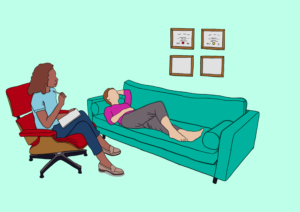What Is Therapy?
Therapy is a type of remedy for a health problem, especially for mental health issues. Each form has different guidance, and it can help with your issues. But keep in mind that not all therapies can make an impact. Many therapies can be helpful and other not so much.

Why Is It Important?
Individual therapy has a goal to motivate change and improve many things in life through self-awareness and to self-explore. When attending therapy, it can help with your communication skills, and help you feel confident.
Want To Experience Therapy?
If therapy is on your mind, there are plenty available. Although, some therapies work best for certain conditions, others can help with many issues.
In therapy, you will have appointments with an experienced mental health professional. There are some things you may do, depending on what methods the therapist recommends and the issues you need help with.
You will discuss any situations that are on your mind, and changes of emotions and behaviour that have affected you. It will most likely involve working through negative, stressful situations and thoughts. It may be tough to open up, but at the end it will be a sense of relief to let it out.
What Are the Types of Therapy?
Here are some common types of therapy and how to pick the right one for you.
Psychodynamic
Psychodynamic therapy is developed from psychoanalysis. What is psychoanalysis? It is a set of theories and healing techniques that deals with the mind, and together creates a treatment method for mental health disorders.
Regards to psychoanalysis, you can talk about anything. Whether it’s thoughts or behaviour that may be causing you to feel some way. It is also common to talk about childhood, past and relationships, along with dreams and fantasies you may have.
Psychodynamic therapy could be a good choice to address issues like depression, anxiety, eating disorder, somatic symptoms, substance abuse, and a variety of other conditions.
Behavioural
Behavioural therapy is a concentrated action aimed at access to mental health treatment. In relation to a theory, specific behaviours expand from things you have learned from your past. Some certain behaviours might have an impact on your life, whether it is negative or causes discomfort. This can help change your behaviour, regarding situations.
Behavioural therapy could be a good choice for addressing anxiety, phobias, substance abuse, attention deficit hyperactivity disorder (ADHD), obsessive compulsive disorder (OCD), aggressive behaviours, and behaviour issues that cause communication and emotional difficulties.
Cognitive Behavioural
Cognitive behavioural therapy is a temporary access to mental health treatment. It is similar to behavioural therapy, but it also aims at an impact on negative, harmful thoughts.
There are specific feelings or beliefs that you have about yourself or many situations in your life which will make you suffer. The suffering may relate to mental health issues or enlarge as a difficulty of other mental health issues.
Cognitive behavioural therapy may be a good choice for addressing mood disorders, like depression and bipolar disorder. Also addressing anxiety, phobias, eating disorders, substance abuse, OCD, insomnia, and schizophrenia.
It can also be extremely helpful for specific conditions when having medication.
Humanistic
Humanistic therapy has a look at the impact on the choices you make, even if it causes you to be distressed. It is based on believing you are a great person to acknowledge your experiences and needs.
Humanistic therapists are there to help you have a better understanding of what you’re going through and offer guidance and support.
It can be useful for confessing self-esteem issues, difficulty handling chronic health issues, trauma effects, depression, relationship issues, substance abuse, not feeling worthy or don’t knowing what to do in life.
Make A Choice
With so many choices, you may feel under-pressured to commit to a certain type. If you have received a mental health diagnosis from a doctor who specialises in mental health, they may have suggestions for your needs.
It is your choice to make. Just know that many therapists have plenty of techniques up their sleeve, which may help you. It is also normal to try one of the therapies, even if it doesn’t work for you. You can always try another type of therapy.
No matter what you choose, therapy can be tough. It may be difficult to open up about mental health issues and thoughts with a stranger. However, it will get easier with time.
If you’re having a difficult time or struggling with mental health issues, your therapist is there to give you help and the support you need. Not getting the help you need, you can always contact a new therapist.
If you would like more information about this topic or want to get in touch, visit our Contact page.